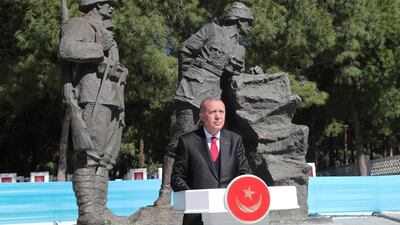The fiery rhetoric of Turkish President Recep Tayyip Erdogan’s election campaign has threatened to damage relations with Australia and New Zealand just weeks ahead of commemorations to mark the First World War Gallipoli campaign.
Every year thousands of tourists from the Antipodes travel to Turkey in a pilgrimage that has forged a strong bond between the three nations.
However, Mr Erdogan’s recent comments about last week’s attacks in Christchurch have provoked alarm in Wellington and Canberra ahead of the April 25 commemorations.
During rallies for local elections on March 31, footage taken by the attacker who killed 50 people in mosques in New Zealand was screened as the president denounced the West’s alleged Islamophobia in a bid to fire up nationalist and religious emotions.
The blurred video, accompanied by the sound of gunfire, has been shown to thousands of voters as well as being carried live on Turkish television.
Speaking at a rally in Canakkale, which is home to the historic battlefields on the shores of the Dardanelles Strait, Mr Erdogan linked the attacks by Australian Brenton Tarrant to Gallipoli in a warning to anyone coming to Turkey with anti-Muslim views.
“Your grandfathers came and saw that we were here,” he said on Monday. “Some of them went back on their feet and some others in coffins. If you come with the same intention, then we are waiting for you. Have no doubt that we will see you off too, the way we did your grandfathers.”
The following day, addressing crowds in the Black Sea province of Zonguldak, the president questioned the motives of Australian and New Zealand soldiers who fought in the 1915 battles. “What business did you have here? We had no issues with you, why did you come all the way over here? The only reason: We’re Muslim and they’re Christian.”
New Zealand Prime Minister Jacinda Ardern said Foreign Minister Winston Peters would “confront” Turkey over the remarks when he arrives in Istanbul on Friday.
“He is going there to set the record straight, face-to-face,” she said. Earlier Mr Peters had expressed concerns that showing the video of the attacks “imperils the future and safety of the New Zealand people and our people abroad”.
In Australia, Prime Minister Scott Morrison summoned the Turkish ambassador over Mr Erdogan’s “highly offensive... and highly reckless” remarks. “I do not accept the excuses that have been offered for those comments,” he said. Australia is reconsidering its travel advice for people planning to attend the 104th Gallipoli anniversary.
Mr Morrison, who said “all options” for further action remained available, accused Mr Erdogan of insulting the memory of Australian and New Zealand Army Corps (ANZAC) troops, which he said violated “the pledge that is etched in stone at Gallipoli.”
A memorial among the war graves at Canakkale carries the heart-rending words of Mustafa Kemal Ataturk, the founder of modern Turkey and a commander during the Gallipoli campaign: “There is no difference between the Johnnies and the Mehmets to us where they lie side by side here in this country of ours... You, the mothers who sent their sons from faraway countries, wipe away your tears; your sons are now lying in our bosom and are in peace. After having lost their lives on this land they have become our sons as well.”
Following Mr Erdogan’s speeches, the quote was widely posted by Turkish social media users.
Around 11,500 ANZAC troops were killed at Gallipoli between April 1915 and the following January, while 86,700 Ottoman soldiers died as Allied forces sought to create a bridgehead to march on Istanbul and knock the Ottomans out of the war.
The battles are regarded as a core part of the national consciousness in all three countries. In Turkey, it is marked by Martyrs’ Day, which fell on Monday, and has become woven into the legend of Ataturk and the creation of the republic. In Australia and New Zealand, the campaign is remembered for the sacrifice of young soldiers by callous British leaders.
This common heritage has led to close ties and the anniversary is usually attended by the heads of each country as well as thousands of soldiers’ ancestors.
Mr Erdogan’s controversial comments came as the country faces rising prices and unemployment while heading for local elections seen as a stern test of his 16-year rule. Opinion polls have shown that the capital Ankara could fall to the opposition for the first time in 25 years while the future of Istanbul, where Mr Erdogan launched his career as mayor in 1994, also hangs in the balance.
Lisel Hintz, assistant professor of international relations at Johns Hopkins University, said the use of the Christchurch footage was “intended to incite fears of Islamophobia and bolster Erdogan's image as protector of Muslims in a world hostile to them.”
She added that the tragedy “provided Erdogan with tragic dots to connect in a picture he could frame opportunistically – if ahistorically – as a kind of Gallipoli 2.0”.

